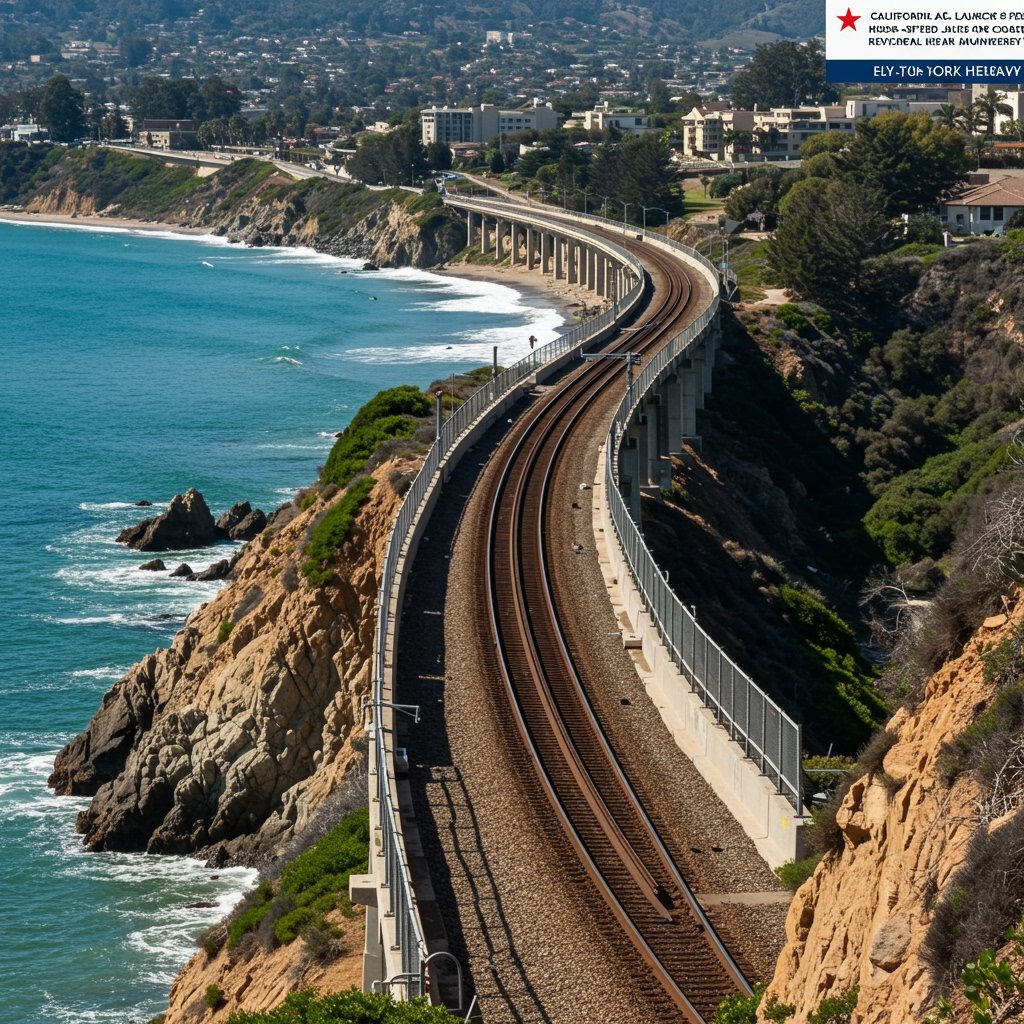State Investigation Launched
Sacramento, CA — The office of California Attorney General Rob Bonta has formally launched a comprehensive investigation into the environmental review process undertaken by the California High-Speed Rail Authority. Announced on May 14, 2025, the probe specifically targets the environmental assessment conducted for a proposed segment of the high-speed rail line slated to traverse the sensitive coastal region within Monterey County.
This significant legal action stems from concerns that the environmental review, mandated under the stringent California Environmental Quality Act (CEQA), may have involved alleged shortcuts. The investigation aims to determine if the Authority’s assessment adequately addressed the potential ecological impacts of the project on critical wetland habitats and vulnerable endangered species.
Controversial Coastal Segment
The focus of the Attorney General’s inquiry is a particularly controversial stretch of the planned high-speed rail route along California’s scenic coastline in Monterey County. This area is known for its unique and fragile ecosystems, including essential wetlands that serve as vital buffers and support diverse aquatic life. The proposed construction within or near these habitats has raised substantial alarm among environmentalists and local residents.
Initial planning phases for this segment, dating back as early as early 2024, are under scrutiny. The Attorney General’s office is examining documentation and procedures from this period, alleging that potential violations of state environmental laws may have occurred during the foundational stages of the environmental assessment.
Environmental Concerns Take Center Stage
The investigation is driven by serious allegations regarding the thoroughness and integrity of the environmental review. Critics contend that the Authority’s assessment failed to gather and present sufficient data to fully understand the project’s footprint on the natural environment. Specifically, the probe is examining potential adverse effects on sensitive ecological features and populations.
A key concern highlighted by the Attorney General’s office involves the potential impact on endangered species. The tidewater goby, a small fish listed under both federal and state endangered species acts, inhabits coastal estuaries and lagoons, habitats prevalent in the targeted Monterey County area. The investigation will assess whether the environmental review properly evaluated the risks posed to this and other sensitive species by construction activities, habitat fragmentation, or alteration of hydrological patterns.
Allegations of a lack of transparency in the review process are also central to the probe. Environmental advocates and concerned citizens claim that the public was not provided with adequate access to information or sufficient opportunities to comment on the potential impacts, hindering meaningful participation in the CEQA process.
Environmental Groups Voice Concerns
Environmental organizations have played a pivotal role in bringing these issues to the forefront. Prominent among these is the group ‘Save Our Coast Now‘, which has been actively campaigning against the proposed coastal route through Monterey County. Representatives from ‘Save Our Coast Now’ formally filed complaints with the Attorney General’s office, outlining their specific concerns regarding the environmental assessment.
Their complaints detailed the alleged shortcomings in the Authority’s review, citing a lack of sufficient data to support the conclusions reached in the environmental impact report. They also emphasized the perceived lack of transparency throughout the process, arguing that critical information was not readily available or clearly communicated to the public and stakeholders.
The actions by groups like ‘Save Our Coast Now’ underscore the deep public interest and concern surrounding the project’s environmental implications in this sensitive region.
AG Bonta Pledges Due Diligence
In announcing the investigation, Attorney General Rob Bonta issued a statement emphasizing the state’s commitment to upholding its bedrock environmental laws. The Attorney General explicitly stated that the investigation’s primary objective is to ensure full compliance with state environmental laws before any construction permits are authorized for this specific, highly contentious segment of the high-speed rail line.
“Our office takes seriously our responsibility to protect California’s precious natural resources and ensure that major infrastructure projects adhere strictly to the laws designed to safeguard our environment,” Bonta stated. “This investigation will thoroughly examine the California High-Speed Rail Authority’s environmental review for the Monterey coastal segment to determine if legal requirements, particularly those under CEQA, have been fully met. We must ensure that potential impacts on critical habitats and endangered species are properly assessed and mitigated before any ground is broken on this section.”
The statement reinforced that the potential violations under review could date back to the early 2024 planning phases, indicating a focus on the foundational work of the environmental impact assessment.
Potential Project Impacts
The Attorney General’s formal investigation introduces a significant new variable into the already complex and protracted development of California’s high-speed rail project. For the Monterey County coastal segment, the probe means that the issuance of any necessary construction permits is now contingent upon the outcome of the Attorney General’s review.
Depending on the findings, the investigation could lead to several potential scenarios. The Authority might be required to conduct supplementary environmental studies, revise its assessment methodologies, implement more robust mitigation measures, or potentially even reconsider the routing of the line through this particular area. The timeline for development on the Monterey coastal segment is now uncertain, pending the results of the state’s thorough environmental compliance review.
This investigation underscores the critical role of state environmental laws, like CEQA, in providing a legal framework for scrutinizing the impacts of large-scale development and highlights the Attorney General’s office’s commitment to enforcing these regulations to protect California’s unique natural heritage.



















